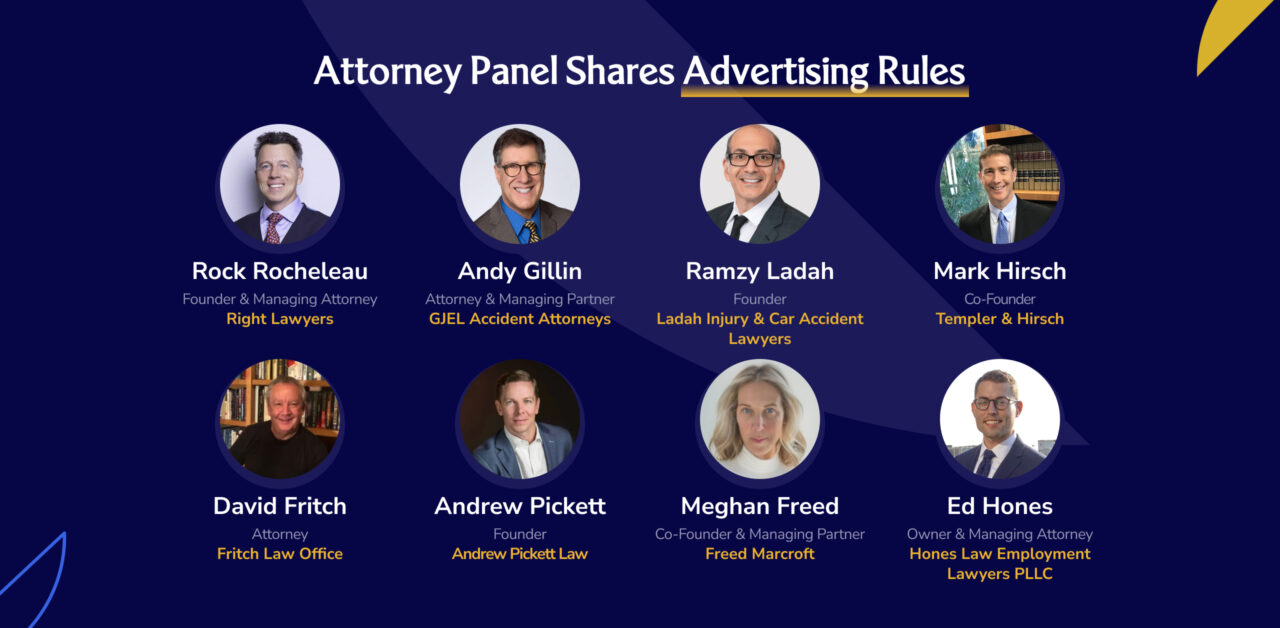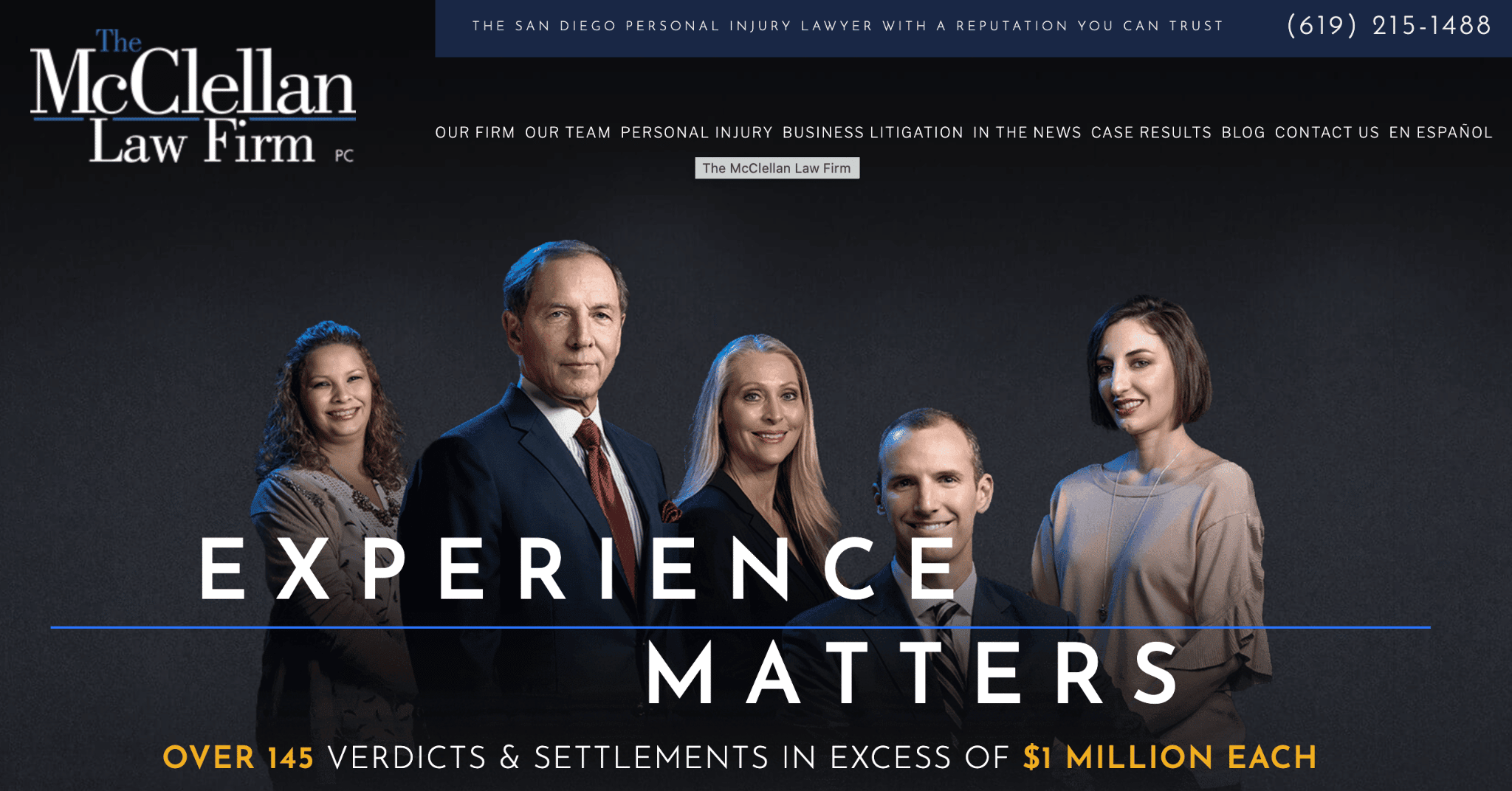Lawyer Advertising Rules For Attorneys in 2025
Legal advertising can be a great way to grow your practice, but it should always be done in compliance with ethical guidelines specifically set for those in the legal profession.
This post covers nine important advertising guidelines that every lawyer needs to know when advertising their legal services. We also asked eight lawyers for their expert advice on navigating ABA regulations.

Is Attorney Advertising Allowed?
Attorney advertising is allowed as long as it follows the Amercan Bar Association’s guidelines on advertising known as Rule 7.2: Communications Concerning a Lawyer’s Services.
Additional advertising rules may apply to each state, so check with your state bar.
The ABA clarified that lawyers may pay for traditional and digital ads, stating that:
“[3] Paragraph (b)(1) allows a lawyer to pay for advertising and communications permitted by this Rule, including the costs of print directory listings, on-line directory listings, newspaper ads, television and radio airtime, domain-name registrations, sponsorship fees, Internet-based advertisements, and group advertising. A lawyer may compensate employees, agents and vendors who are engaged to provide marketing or client development services, such as publicists, public-relations personnel, business-development staff, television and radio station employees or spokespersons and website designers.”
Rock Rocheleau, founder and managing attorney at Right Lawyers, summarizes what lawyers should and shouldn’t focus on when launching advertising campaigns:

Attorneys must ensure that their advertising does not create unjustified expectations or make false promises. Language that guarantees a particular outcome or suggests that legal services will always result in a favorable result should be avoided. Instead, advertisements should be focused on providing clear and accurate information about the services offered, without overpromising or making exaggerated claims.

Quick Constitutional History of Legal Advertising
Essentially, the First Amendment lets lawyers advertise, which is great for reaching clients. But there are limits. Ads can’t be fake, misleading, or dishonest. The goal is to balance a lawyer’s right to share information about their services with the need to protect people and keep the legal field honest. So, lawyers can advertise, but the government can step in to ensure that their ads are truthful and genuinely provide help to the public.
Prior to 1976, lawyer advertising wasn’t protected by the First Amendment and was outrightly banned. This changed with the Virginia Citizens Consumer Council v. Virginia State Board of Pharmacy case, where the court ruled that commercial speech is entitled to First Amendment protection.
In 1977, the Bates v. State Bar of Arizona case lifted a state ban on lawyers advertising their legal fees, with the court stating that this information helps the public make informed decisions in hiring attorneys. The court, however, reiterated that ads needed to be truthful; otherwise, they may be prohibited.
In the case of Ohralik v. Ohio State Bar in 1978, the court upheld a ban on in-person solicitation, saying that the court prohibits lawyers from offering their services to people they know, as this may be coercive and intrusive, especially when people are vulnerable.
Finally, in the Zauderer v. Office of Disciplinary Counsel case in 1985, the court ruled that it couldn’t prohibit print ads containing legitimate and truthful legal advice. However, the court upheld its requirements for disclosure of information to avoid deceptive practices.
As a result of these cases, state bars began implementing lawyer advertising rules that align with the court’s guidelines. These include:
- Implementing strict rules against solicitation in person or over the phone, with written and recorded communications being regulated
- Prohibiting false or misleading statements
- Preventing lawyers from claiming superiority over other lawyers or law firms
- Prohibiting lawyers from unsubstantiated claims of expertise
- Flagging false testimonials
- Encouraging lawyers to disclose legal fees and costs
- Reviewing advertisements by the state bar’s ethics committee
1. Never Claim to Be an Expert
As an attorney, you have a specialization and certain areas of practice. But you may not be able to claim to be an expert in them unless you have proof.
The ABA Rule 7.2 provision states that:
“A lawyer shall not state or imply that a lawyer is certified as a specialist in a particular field of law, unless:
- The lawyer has been certified as a specialist by an organization that has been approved by an appropriate authority of the state or the District of Columbia or a U.S. Territory or that has been accredited by the American Bar Association; and
- The name of the certifying organization is clearly identified in the communication.”
Here’s Andy Gillin, managing partner at GJEL Accident Attorneys, to explain:

The ABA rules are clear: you can’t call yourself a “specialist” or an “expert” unless you have been certified by an appropriate organization. Instead, focus on your specific experiences and successes without labeling yourself improperly. It’s better to describe the types of cases you’ve handled and the results you’ve achieved than to make unfounded claims about your status.

Ramzy Ladah, founder of Ladah Injury & Car Accident Lawyers, shares his experience in addressing this issue during a pivotal phase in his career:

One common mistake I see beginner attorneys make in advertising is overstepping the boundaries of claiming expertise. I learned this firsthand. I was cautious about avoiding these terms until I became a certified personal injury specialist, ensuring my advertising remained compliant.

Looking for ideas to build your advertising strategy on?
The McLellan Law Firm is a great example of attorney advertising that is not claiming to be an expert but letting their experience and successful cases speak for their firm.

2. Direct Attorney Solicitation is Prohibited
What’s not allowed, however, is solicitation, which is when a lawyer actively promotes and persuades a person to hire him for his legal services.
This applies to all forms of communication, whether in person, on the phone, or via email. The ABA details the reasons for this in their guideline, Rule 7.3 Solicitation of Clients where it states:
“A lawyer shall not solicit professional employment by live person-to-person contact when a significant motive for the lawyer’s doing so is the lawyer’s or law firm’s pecuniary gain, unless the contact is with a:
- Lawyer;
- person who has a family, close personal, or prior business or professional relationship with the lawyer or law firm; or
- person who routinely uses for business purposes the type of legal services offered by the lawyer.
A lawyer shall not solicit professional employment even when not otherwise prohibited by paragraph if:
- the target of the solicitation has made known to the lawyer a desire not to be solicited by the lawyer; or
- the solicitation involves coercion, duress or harassment.”
Solicitation by an attorney, particularly when done after a tragic incident, can be considered exploitation of vulnerable people for monetary gain.
3. You Can’t Compensate Clients For Testimonials
According to ABA’s Rule 7.2, law firms and lawyers should not pay or offer gifts in exchange for customer testimonials to be used in attorney advertising.
The provision makes this stance in two parts::
“ A lawyer shall not compensate, give or promise anything of value to a person for recommending the lawyer’s services,”
and that…
“A lawyer shall not give nominal gifts as an expression of appreciation that are neither intended nor reasonably expected to be a form of compensation for recommending a lawyer’s services.”
Most law firms have a review generation strategy, but they ensure it adheres to ABA guidelines.
Generally, a lawyer or law firm puts a link on their website where former clients can leave a review. If the firm has a Google Business Profile, previous or current clients can leave a review anytime. Either way, these are acceptable means of getting reviews in digital advertising, as it is expected that people would leave a review of their own accord.
Here’s an example of authentic reviews for the Grife Law Firm, which past clients posted on the firm’s Google Business Profile:

4. Don’t Make False Statements
Lawyers have the responsibility to be truthful in advertising their services to potential clients. While most lawyers understand this prohibition of false advertisement, there are others who might not even realize they’re doing it.
Some examples of false law firm advertising are:
- Claiming to be a specialist or expert without a valid certification
- Stating a guaranteed outcome, such as winning a case
- Claiming exaggerated numbers of verdicts without proof
- Falsely presenting qualifications such as educational background and years of experience
- Showing testimonials from actors and not actual clients
- Not disclosing contingency fees or limitations for “free consultations”
Rather than promising results, focus on highlighting your qualifications and how it can help your potential clients with their cases.
Our client, Staver Accident Injury Lawyers, does a great job on their legal advertising page. They described how they would help a potential client without making any definite promises.

5. Ethical Considerations: Use Disclaimers When Needed
Even if your ads comply with every rule, there are some statements you make where you need to insert a disclaimer.
For instance, citing successful cases of past clients might suggest to potential clients that they’ll get the same result even if you don’t say it in your ad.
To stop viewers from expecting a sure win, you can use a disclaimer that says: “Past results are not a guarantee of future outcomes.”
This practice should also apply to any detail about your practice that might be misinterpreted by your audience, including your expertise, qualifications, fees, and testimonials.
A few tips on creating disclaimers include:
- Clarity. Your disclaimers should provide complete information and be written in plain language that an average person can easily understand.
- Placement. The disclaimer should be placed immediately after the related content or statement.
- Truthfulness. A disclaimer shouldn’t be used to “hide” untrue claims. If the underlying claim isn’t true, using a disclaimer doesn’t make it ethical.
Here’s an example of a disclaimer from the law firm Morgan & Morgan’s website, shown below the details of a winning case:

Attorney Mark Hirsch of Templer & Hirsch explains why disclaimers are important for your ads:

Always ensure that ads are honest, don’t confuse people, and follow ABA Model Rule 7.1 and any state-specific rules.
If you use actors in ads, it must be clear that they’re not lawyers. Disclaimers should be easy to see to prevent people from being misled.

David Fritch of Fritch Law lays out his practice on honest advertising for his firm:

Avoid implying your services are superior or criticizing competitors. Focus on educating potential clients about your services. Your website, social media, and marketing materials are considered advertising and subject to ethics rules. Carefully review all public content to ensure it’s honest, transparent, and aimed at educating potential clients about your services.

6. Know What’s Off Limits in Attorney Advertisements
Keep in mind that these are the details about your practice that you can include in ads:
- Awards
Recognitions and awards from reputable organizations are welcome to be included in your legal advertising and other marketing content (like a law firm website).
Our client, The Goldberg Legal Group, features award badges on their homepage:

- Practice Area
- Location
- State Bar associations
Most lawyers include their state bar associations to strengthen their credibility and qualifications. Here’s one of our clients, Atty. Michael J. Goldstein, including his current bar association in his lawyer profile:

- Rates
- Languages spoken
Some prohibited information on lawyer ads include:
- Pending cases
- Client names
- Fake law firm/lawyer name
- Fake legal documents
Additionally, targeting vulnerable people in a digital advertising campaign is prohibited and goes against ethical standards of the legal practice.
7. Find Out if You Can Use Your Trade Name
If you have a trade name for your firm or are thinking of using one in your ads, check with your State Bar regulations if this is allowed.
New York, for example, doesn’t allow lawyers to use a trade name. The New York State Bar’s Ethics Opinion 1017, states that:
“A lawyer in private practice shall not practice under a trade name, a name that is misleading as to the identity of the lawyer or lawyers practicing under such name, or a firm name containing names other than those of one or more of the lawyers in the firm, except that by the name of a professional corporation shall contain “PC” or such symbols permitted by law, the name of a limited liability company or partnership shall contain “LLC,” “LLP” or such symbols permitted by law…”
8. Know How Long You Need to Retain Advertising Records
Lawyers no longer need to keep copies of their ads for two years, which was a past rule from the ABA. This rule was taken out in 2002 because it was too much work for law firms. Today, there’s no general ABA rule saying lawyers must hold on to ads for a year anymore.
But keep in mind that states can still make their own rules about saving ad records.
In the State of California, for instance, you have to keep a copy for four years.
Here’s an excerpt from the State Bar of California:
“Providers must keep all records, including the records of attendance, agendas, copies of written materials and promotional materials (if any) for four years from the date the program is held.”
9. Don’t Promise The Same Results as Previous Winning Cases
Law firm ads often highlight past winning cases to attract new clients, and it can be tempting for law firms to guarantee results. However, you should avoid promising results in your ads, as this can be viewed as false advertising.
You can still use successful cases as examples of your expertise, but never claim or guarantee the exact outcome in your ads.
Instead, use disclaimers and avoid exaggerated claims to avoid making promises to your future clients.
Lawyer Andrew Pickett share common mistakes law firms make when discussing past successful cases:

One common misstep is making statements that could be interpreted as guarantees of success or specific outcomes—language like “guaranteed results” can lead to significant compliance issues under ABA rules.
Testimonials can be tricky; while they can showcase past successes, they should not create unrealistic expectations and must be carefully vetted to ensure compliance.

Meghan Freed, co-founder and managing partner at Freed Marcroft, shares a similar warning:

The ABA requires that advertisements be truthful and not create unjustified expectations about the outcome of legal matters.
While testimonials can be compelling, they must not be misleading or suggest that similar outcomes are guaranteed for all clients. The ABA prohibits testimonials that imply a promise of success or that are not representative of typical results.

To avoid this advertising mishap, you need to familiarize yourself with the differences between misleading and truthful language.
For example, employment law firm owner Ed Hones shares some of the typical phrases and platitudes that problematic ads tend to include:

To remain compliant, lawyers should avoid specific language that implies guaranteed outcomes, such as “win every case,” “no fee unless we win,” or “we recover millions for our clients,” unless these statements can be factually substantiated and are not misleading.
By ensuring that all advertising is truthful, clear, and supported by facts, attorneys can avoid ethical violations and build trust with potential clients.

10. Check State-Specific Advertising Rules
Each state has its own spin on legal ethics rules based on the ABA Model Rules, and this really changes how you can market legal services. Lawyers need to be cautious when creating ads, including words used, what your website looks like (like how close things are and the font you pick), getting ads approved, how you use award badges, and what kind of recognition you can talk about.
Here are some state-specific rules for legal ads:
- Texas: Lawyers in Texas need to submit certain types of advertising, particularly ads that reference past results, comparisons or endorsements, to the Advertising Review Committee for preapproval.
- Missouri: Legal professionals’ advertising must contain the disclosure: “Selecting legal counsel is a significant decision; therefore, individuals should refrain from making a selection based solely on advertising.”
- New Jersey: New Jersey’s attorney advertising rules, overseen by the Committee on Attorney Advertising, mandate specific disclosures for legal awards and recognitions, including descriptions of the awarding organization and its methodology alongside disclaimers. The use of Chambers quotes in client testimonials is prohibited. Client testimonials must adhere to specific name formats, and the committee may request proof of the client relationship.
- Florida: In Florida, legal ads require prior authorization from the Bar Association or governing body to ensure they adhere to ethical standards and prevent misleading information.
- Kentucky: The state of Kentucky requires ads containing client testimonials, results, or endorsements to be submitted for review by the Advertising Commission.
- Louisiana: Attorneys in Louisiana must submit advertisements, including TV, radio, print, internet, and other electronic advertisements, for review by the Office of Disciplinary Counsel within 30 days of their first dissemination.
- Mississippi: Mississippi has filing requirements for ads that contain endorsements, dramatizations, or testimonials, and mandates disclaimers when using actors or simulated events.
- Nevada: The state of Nevada requires all attorney advertisements to be filed with the state bar within 15 days of the first dissemination. The state has strict rules on claims of past results, and require law firms to be transparent.
Check with your State Bar and make sure you study all its guidelines in legal advertising.
Final Thoughts: Evolution of Advertising For Law Firms
In an article, the ABA reveals that consumers respond negatively to certain advertising styles that seem exaggerated, unprofessional, and outlandish. It says that: “The use of inappropriately dramatic music, unseemly slogans, hawkish spokespersons, premium offers, slapstick routines, or outlandish settings in advertising does not instill confidence in the lawyer or legal profession and undermines the serious purpose of legal service and the judicial system.”
The key takeaway from this is that the best approach to legal advertising is to present an honest, sincere, and accurate representation of your firm or practice. People should always perceive a lawyer to be trustworthy and exhibit professional conduct at all times.
The next step in legal advertising would be to choose your platform.
Traditional methods like print and radio ads may have worked decades ago, but today, there’s a massive shift to digital marketing for law firms. Legal marketing methods like search engine optimization (SEO), social media marketing, and paid digital advertising like Google Ads are becoming the norm.
You can spend time to learning basic SEO practices and using pay-per-click (PPC) ads to build an online presence and generate leads. But if you don’t have the time or resources, you can hire On The Map Marketing, which serves clients in the legal industry, to do this for you.
Contact us today to get started with creating digital advertising campaigns that attract clients and grow your firm!
Table of Contents
Related Articles
Dominate Your Market with Digital Marketing Services That Deliver
Talk to a certified professional today, and we will design a strategy specific to your case.







